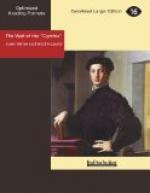By the beginning of February, 1879, all was ready. The “Alaska” had therefore five months before the first of June to reach Behring’s Straits, which was accounted the most favorable season for the exploration. They intended also to take the most direct route, that is to say, through the Mediterranean, the Suez Canal, the Indian Ocean, and the China Seas, stopping successively to take in coal at Gibraltar, Aden, Colombo in Ceylon, Singapore, Hong Kong, Yokohama, and Petropaulosk.
From all these stations the “Alaska” was to telegraph to Stockholm, and it was also agreed that, if in the meantime any news was received of the “Vega,” they should not fail to send information.
The voyage of the “Alaska,” although intended primarily for an arctic exploration, would begin by a voyage through tropical seas, and along the continents most favored by the sun. The programme had not, however, been arranged to give them pleasure; it was the result of an imperative necessity, since they must reach Behring’s Straits by the shortest route and remain in telegraphic communication with Stockholm up to the last moment. But a serious difficulty threatened to retard the expedition. They had spent so much in equipping the vessel that the funds which were indispensable for the success of the enterprise, began to run short. They would require considerable to purchase coal, and for other incidental expenses.
A new appeal for money became necessary. As soon as it was issued the committee received two letters simultaneously.
One was from Mr. Malarius, the public teacher of Noroe, and laureate of the Botanical Society. It contained a check for one hundred kroners, and begged that he might be attached to the expedition as the assistant naturalist of the “Alaska.”
The other contained a check for twenty-five thousand kroners, with this laconic note:
“For the voyage
of the ‘Alaska,’ from Mr. Tudor Brown,
on condition
that he is received
as a passenger.”
CHAPTER XII.
Unexpected passengers.
The request of Mr. Malarius could only be received with gratitude by the committee. It was therefore passed enthusiastically, and the worthy teacher, whose reputation as a botanist was greater than he himself suspected, was appointed assistant naturalist of the expedition.
As for the condition upon which Tudor Brown bestowed his donation of twenty-five thousand kroners, both Dr. Schwaryencrona and Mr. Bredejord were strongly inclined to refuse to grant it. But if called upon to give some motive for their repugnance, they had to confess that they would not know what to say. What sufficient reason could they give the committee if they asked them to refuse such a large subscription? They really had no valid one. Tudor Brown had called upon Dr. Schwaryencrona, and brought him a certified account of the death of Patrick O’Donoghan;




